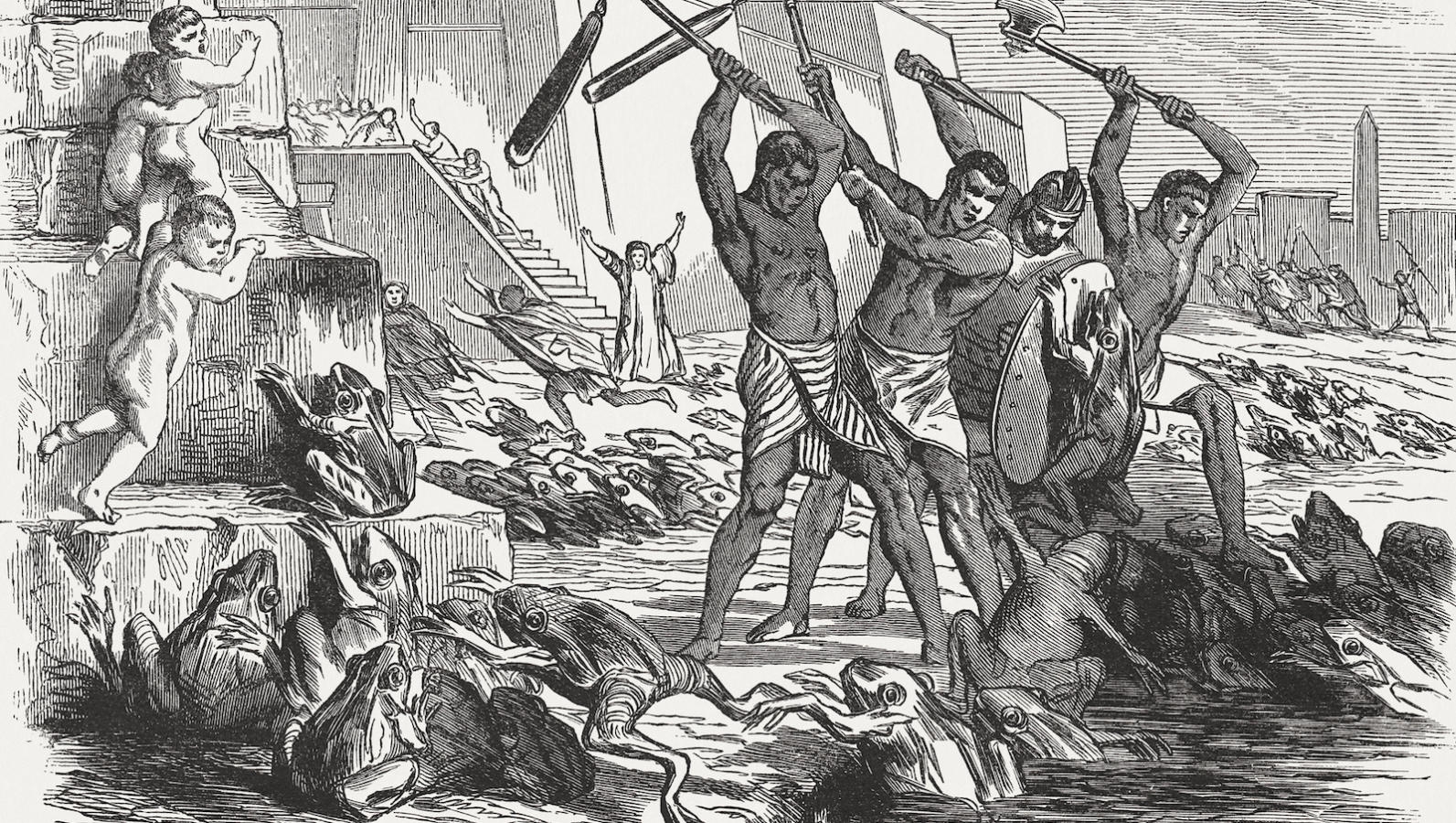Commentary on Parashat Vaera, Exodus 6:2-9:35
“Bay Area fishermen are rejoicing,” said one friend, sitting back in his chair after our Shabbat meal of salmon and side dishes. “The ban on certain fish is being lifted.”
“I don’t see how that’s possible. Have you been down to the bay? A month after the spill and it still stinks.”
I had been following the articles in the paper. Early the previous November, the container ship Cosco Busan had gouged its hull against a tower of the Bay Bridge, dumping 58,000 gallons of toxic bunker fuel into the water. This week’s Torah portion also describes something awful emerging from the waters–the plague of frogs.
One Big Frog
The Midrash, seizing on a grammatical irregularity, suggests that a single, enormous frog emerged from the Nile and, only when the Egyptians attacked it, did it split and split again, replicating into more and more teeming amphibians (Exodus Rabbah 10:4). By attacking the frog, the Egyptians unwittingly made the situation worse for themselves and were thus active agents in their own misery. What is the Midrash trying to teach us with this fanciful construction?
With your help, My Jewish Learning can provide endless opportunities for learning, connection and discovery.
The Midrash suggests a deadly myopia, an inability to see beyond the symptom to the cause. Like the fabled rescuer of drowning victims too busy to look upstream to see what’s pushing hordes of people into the water, the Egyptians were too occupied with the existence of the enormous frog to ask what it was doing there in the first place.
We readers are lucky, for the text spells out for us no fewer than ten times the cause of the plagues–to teach us that “the earth belongs to God (Exodus 9:29).” Pharaoh and his people persisted in attacking the symptom, the challenge to his ultimate power. His misguided philosophy, mirrored by his people’s actions, is expressed in the imagination of the Midrash: when you find things you don’t like, hit them with a stick and they’ll go away.
But they don’t. The Egyptian people soon found themselves overrun, their mixing bowls, their beds, heaped with frogs. Today, months after the oil spill, the San Francisco bay continues to stink, reminding us of the 58,000 gallons of bunker fuel washed onto shore and out to sea.
The frogs are still with us.
Environmental Degradation
The oil spill is the symptom, and it has received plenty of attention. Journalists, environmentalists, and teams of volunteers have attacked the spill. Looking at it one way, we’ve fared luckier than the Egyptians: the bay is being cleaned up. But from another perspective, from further upstream, come difficult questions: What are the root causes of such environmental disasters? Is the spill the fault of the oil company alone? Who consumes the oil? Who creates the demand for supply?
It is in these questions that we uncover the nexus of the two messages of the Midrash. The narrowness of the Egyptians’ vision is what enables their complicity in the plague. In the same way, we focus on cleaning up the oil in the bay because it helps us feel like we’re making things better, even as it distracts us from the difficult truth of our own complicity in ecological degradation.
We may be concerned and conscientious people. Some of us recycle, some contribute to environmental causes, some of us reduce our carbon footprint. Yet the Midrash pushes all of us to acknowledge that we, too, are responsible. Our limited vision, like that of the Egyptians, is the stick that exacerbates the plague. Indeed, who in this fossil fuel-based society is not complicit in the stink? Who does not add more frogs to the pile?
Like the Egyptians devastated by the arrival of the plagues, we become concerned only when the plague, the spill, reaches our back door. But the frogs, the environmental damage which we’ve inadvertently created, are a shared plague, and all of us are implicated. Anything short of a change in fundamental perspective, a humanity-wide recognition that we share a single fragile ecosystem, constitutes another futile attempt to beat the creature back into the river.
If we look upstream, however, to find the source of the plague, we will find there not some supernatural curse, but ourselves, sheepishly putting the enormous frog in the water. If we choose to, we could spare ourselves the Egyptian’s slow process of learning through suffering. We could demonstrate our understanding that we do not own the world. If we learn that lesson, perhaps our descendants will be able to enjoy the Bay as the Creator meant it to be.
Provided by American Jewish World Service, pursuing global justice through grassroots change.
Midrash
Pronounced: MIDD-rash, Origin: Hebrew, the process of interpretation by which the rabbis filled in “gaps” found in the Torah.
Shabbat
Pronounced: shuh-BAHT or shah-BAHT, Origin: Hebrew, the Sabbath, from sundown Friday to sundown Saturday.



